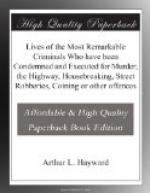He was no sooner at liberty but he fell to his old trade, and was just as unlucky as he was before; for taking it into his head to rub off with a firkin of butter, which he saw standing in a cheesemonger’s shop, he was again taken in the fact, and in the space of a few weeks recommitted to his old lodging. At first he apprehended the crime to be so trivial that he was not in the least afraid of death, and therefore his amazement was the greater when he was capitally convicted. During the first day after sentence had been pronounced, the extremity of grief and fear made him behave like one distracted; as he came a little to himself, and was instructed by those who charitably visited him, he owned the justice of his sentence, which had been passed upon him, and the notorious wickedness of his misspent life. He behaved with great decency at chapel, and as well as a mean capacity and a small education would give him leave, prayed in the place of his confinement.
As there is little remarkable in this malefactor’s life, permit me to add an observation or two concerning the nature of crimes punished with death in England, and the reasonableness of any project which would answer the same end as death, viz., securing the public from any of their future rapines, without sending the poor wretches to the gallows, and pushing them headlong into the other world for every little offence. The galleys in other nations serve for this purpose and the punishment seems very well suited to the crime; for his life is preserved, and he, notwithstanding, effectually deprived of all means of doing further mischief. We have no galleys, it is true, in the service of the crown of Britain, but there are many other laborious works to which they might be put so as to be useful to their country. As to transportation, though it may at first sight seem intended for their purpose, yet if we look into it with ever so little attention, we shall see that it does not at all answer the end; for we find by experience that in a year’s time, many of them are here again, and are ten times more dangerous rogues than they were before; and in the plantations they generally behave themselves so ill that many of them have refused to receive them, and have even laid penalties on the captains who shall land them within the bounds of their jurisdiction. It were certainly therefore, more advantageous to the public that they worked hard here, than either forced upon the planters abroad, or left in a capacity to return to their villainies at home, where the punishment being capital, serves only to make them less merciful and more resolute. This I propose only, and pretend not to dictate.
But it is now time we return to the last mentioned criminal, Richard Scurrier, and inform ye that at the time he suffered, he was scarce eighteen years of age, dying with the malefactors Hamp, Bird, Austin and Foster, before-mentioned, on the 22nd of December, 1725, at Tyburn.




